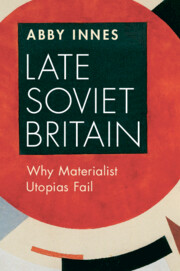Book contents
- Late Soviet Britain
- Late Soviet Britain
- Copyright page
- Epigraph
- Contents
- Figures
- Acknowledgements
- Introduction
- Part I The Materialist Utopias
- 1 Rationality and Closed-System Reasoning
- 2 General Equilibrium and the Balanced Plan
- 3 On Bureaucracy
- 4 On ‘Organised Forgetting’ in the Governing Science
- Part II Britain’s Neoliberal Revolution
- Part III The Rise and Fall of the Neoliberal ‘Movement Regime’
- Index
4 - On ‘Organised Forgetting’ in the Governing Science
from Part I - The Materialist Utopias
Published online by Cambridge University Press: 14 September 2023
- Late Soviet Britain
- Late Soviet Britain
- Copyright page
- Epigraph
- Contents
- Figures
- Acknowledgements
- Introduction
- Part I The Materialist Utopias
- 1 Rationality and Closed-System Reasoning
- 2 General Equilibrium and the Balanced Plan
- 3 On Bureaucracy
- 4 On ‘Organised Forgetting’ in the Governing Science
- Part II Britain’s Neoliberal Revolution
- Part III The Rise and Fall of the Neoliberal ‘Movement Regime’
- Index
Summary
This chapter reflects on how both Soviet and neoclassical economic doctrines impose a practice of ‘organised forgetting’: the omission and rejection of knowledge that does conform to the presumed ontology. In adopting the language of science, both Soviet and neoliberal ideologies would attack their political opponents as primitives, unschooled in their singular methods of reasoning. Neoliberalism, in particular, is neverthless more accurately understood as working against the scientific method, depending as it does on argument from abstract, de-historicized assumption, as distinct from evidence-based justification, theoretical review and adaptation. The chapter traces how neoclassical theory was translated into a political agenda for the New Right through the 1970s. It closes by introducing the neoliberal governmental toolkit of the New Public Management, and explains why, following the isomorphism in their forms of reasoning, NPM would recreate the Stalinist toolkit of quantification, output planning, targets and managerial ‘correct lines’, only now in capitalist form. The analytical foundations are thus set for the policy chapters that follow.
- Type
- Chapter
- Information
- Late Soviet BritainWhy Materialist Utopias Fail, pp. 105 - 124Publisher: Cambridge University PressPrint publication year: 2023



